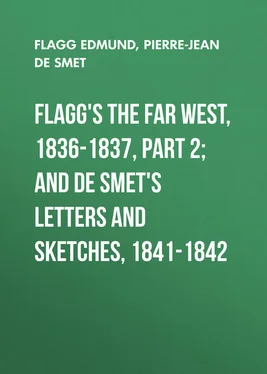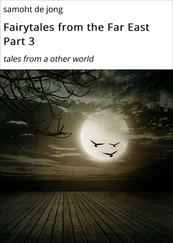Edmund Flagg - Flagg's The Far West, 1836-1837, part 2; and De Smet's Letters and Sketches, 1841-1842
Здесь есть возможность читать онлайн «Edmund Flagg - Flagg's The Far West, 1836-1837, part 2; and De Smet's Letters and Sketches, 1841-1842» — ознакомительный отрывок электронной книги совершенно бесплатно, а после прочтения отрывка купить полную версию. В некоторых случаях можно слушать аудио, скачать через торрент в формате fb2 и присутствует краткое содержание. Издательство: Иностранный паблик, Жанр: foreign_antique, foreign_prose, на английском языке. Описание произведения, (предисловие) а так же отзывы посетителей доступны на портале библиотеки ЛибКат.
- Название:Flagg's The Far West, 1836-1837, part 2; and De Smet's Letters and Sketches, 1841-1842
- Автор:
- Издательство:Иностранный паблик
- Жанр:
- Год:неизвестен
- ISBN:нет данных
- Рейтинг книги:4 / 5. Голосов: 1
-
Избранное:Добавить в избранное
- Отзывы:
-
Ваша оценка:
- 80
- 1
- 2
- 3
- 4
- 5
Flagg's The Far West, 1836-1837, part 2; and De Smet's Letters and Sketches, 1841-1842: краткое содержание, описание и аннотация
Предлагаем к чтению аннотацию, описание, краткое содержание или предисловие (зависит от того, что написал сам автор книги «Flagg's The Far West, 1836-1837, part 2; and De Smet's Letters and Sketches, 1841-1842»). Если вы не нашли необходимую информацию о книге — напишите в комментариях, мы постараемся отыскать её.
Flagg's The Far West, 1836-1837, part 2; and De Smet's Letters and Sketches, 1841-1842 — читать онлайн ознакомительный отрывок
Ниже представлен текст книги, разбитый по страницам. Система сохранения места последней прочитанной страницы, позволяет с удобством читать онлайн бесплатно книгу «Flagg's The Far West, 1836-1837, part 2; and De Smet's Letters and Sketches, 1841-1842», без необходимости каждый раз заново искать на чём Вы остановились. Поставьте закладку, и сможете в любой момент перейти на страницу, на которой закончили чтение.
Интервал:
Закладка:
Here, too, has been witnessed something of "the pride, and pomp, and circumstance of glorious war." The fleur-de-lis of the Fifteenth Louis has rolled out its heavy folds above these stern old towers; the crimson Lion of England has succeeded; and the stripes and stars of our own republic have floated over both in triumph. The morning gun of the fortress has boomed across the broad prairie, and been reverberated from yonder cliffs: the merry reveille has rose upon the early breeze, and wakened the slumbering echoes of the forest; and the evening bugle from the walls has wailed its long-drawn, melancholy note along those sunset waters of the Eternal River !
Such, I repeat, was Fort Chartres in its better days, but such is Fort Chartres no more. I lingered for hours with saddened interest around the old ruins, until the long misty beams of the setting sun, streaming through the forest, reminded me that I had not yet secured a shelter for the coming night. Remounting my horse, I left the spot at a brisk pace, and a ride of a few miles brought me to a dwelling situated upon a mound somewhat elevated from the low, flat bottom-land around, about one mile from the Mississippi, and commanding a view of the distant lake and bluffs to the north. Here, then, I affix the name by which is known all the surrounding region.
Fort Chartres, Ill.
XXXIX
"I know not how the truth may be,
I tell the tale as told to me."
"Pride, pomp, and circumstance of glorious war."
Fort Chartres has already detained me longer than was my design. My pen has been unconsciously led on from item to item, and from one topic to another; and now, in leaving this celebrated fortress, I cannot forbear alluding to a few incidents connected with its origin and early history, which have casually presented themselves to my notice. Selection is made from many of a similar character, which at another time and in a different form may employ the writer's pen. The conclusion of my last number attempted a description of the spot from which it was dated; and, reader, a beautiful spot it was, beneath the soft, gentle radiance of a summer evening. Not soon, I ween, shall I forget the wild romance of that moonlit scene as I reclined upon the gray old bench at the door of the farmhouse after the evening meal was over, and listened to the singular events of which that region had been the theatre in other days. More than forty years had seen mine host a resident of the spot, and no one, with diligence more exemplary than his own, had gathered up the curious legends of the place, many of them from aged men who had themselves been witnesses of the events they chronicled. By these traditions, whatever may be our inclination to yield them credence at this late period, the origin and history of the fortification of Fort Chartres is by no means devoid of interest. In 1720, when it was resolved on by the crown of France to erect a fortress at this point upon the Mississippi, in continuation of her line of posts uniting Quebec with New-Orleans, and for the defence of her colonies, a military engineer of the school of the celebrated Sebastian Vauban was sent over to project and accomplish the design. 57To his own discretion, within prescribed limits – so goes the story – was confided the whole undertaking. Far and wide throughout the province resounded the note of preparation. The peaceful villager was summoned from his pipe and his plough; the din of steel and stone broke in upon the solitudes; and at length, at the enormous expenditure of nine millions of livres, arose Fort Chartres; and its battlements frowned over the forests and cast their shadows along the waters of the Eternal River ! The work was completed, and fondly believed its architect that he had reared for his memory a monument for the generations of coming time. A powerful battery of iron ordnance protruded from the ports, and every department of the fortress was supplied with the most extensive munitions of war. A large number of cannon for many years were laying beneath the walls of the fort, in the early part of the present century, buried in matted vines and underbrush. The fortress was completed, and the silver lilies floated over the walls; but the engineer had far exceeded the limits prescribed in erecting a work of such massive and needless strength, and a missive royal summoned him to St. Cloud. The miserable man, aware that little was to be hoped from the clemency of the warlike Louis XV., poisoned himself upon arriving in his native land, to escape the indignation of his sovereign. Previously, however, to his departure for France, immense sums in gold for defraying the expenses of the fortress had been forwarded him to New Orleans and sent up the river, but, owing to his subsequent arrest, were never distributed to the labourers. Tradition averreth these vast treasures to have been buried beneath the foundations of the fort. However the truth may be, the number of those who have believed and searched has not been inconsiderable: but unhappily, as is ever the case with these "hidden treasures," the light has gone out just at the critical moment, or some luckless wight, in his zeal, has thought proper to speak just as the barrel of money has been struck by the mattock, or some other untoward event has occurred to dissolve the charm of the witch-hazel, and to stir up the wrath of those notable spirits which are always known to stand guard over buried gold! And thus has it happened that the treasure yet reposes in primeval peace; and the big family Bible, always conveyed to the spot on such inquisitorial occasions, has alone prevented consequences most fatal! Whether the good people of the vicinity in the present unbelieving generation have faith to dig, I know not; but, when I visited the spot, the earth of the powder-magazine to which I have alluded exhibited marvellous indication of having been disturbed at no distant period previous. So much for the origin of Fort Chartres. The story may be true, it may not . At all events, it will be remembered I do not endorse it.
There is also a tradition yet extant of a stratagem of war by which Fort Chartres was once captured, worthy the genius of Fabius Maximus, and partaking, moreover, somewhat of history in character. The name of George Rogers Clarke is familiar to every one who can claim even indifferent acquaintance with the early border warfare of the West. This extraordinary man, having satisfied himself, like Hannibal of Carthage, that the only way decisively to conquer a crafty and powerful foe was by carrying the war to his own altars and hearths, placed himself at the head of a few hundred of the Virginia militia in 1778, and set forth upon one of the most daring enterprises ever chronicled on the page of military history – the celebrated expedition against the distant post of Fort Vincent, now Vincennes. Our country was then at war with Great Britain, and this fort, together with those upon the lakes and the Mississippi, were in possession of the enemy and their savage allies. Colonel Clarke crossed the mountains with his little band; descended the Monongahela and the Ohio to within sixty miles of the mouth of the latter, and there concealing his boats, he plunged with his followers through swamps, and creeks, and marshes almost impassable, a distance of one hundred and thirty miles, and in a space of time incredibly short, arrived at night opposite the village of Kaskaskia. So overwhelming was the surprise, that the town, though fortified, was taken without a blow. History goes on to tell us that a detachment of troops, mounted on the horses of the country, was immediately pushed forward to surprise the villages of Fort Chartres and Cahokia, higher up the Mississippi; and that they were all taken without resistance, and the British power in that quarter completely destroyed. 58So much for History, now for Tradition. When the little band arrived beneath the walls of Fort Chartres, the numbers of the garrison far exceeding those of the besiegers, the latter, as if in despair of success, shortly took up the line of march and disappeared behind the distant bluffs. Days passed on; diligent examination of the heights was kept up with glasses from the walls, but no enemy returned. At length, when apprehension had begun to die away, early one morning a troop of cavalry appeared winding over the bluffs, their arms glittering in the sunlight, and descended from view apparently into the plain beneath. Hour after hour the march continued; troop after troop, battalion upon battalion, regiment after regiment, with their various ensigns and habiliments of warfare, appeared in lengthened files, wound over the bluffs, and disappeared. Alarmed and astonished at the countless swarms of the invaders, the garrison hastily evacuated the fortress, and for dear life and liberty, soon placed the broad Mississippi between themselves and the cloud of locusts! Hardly was this precipitate manœuvre well accomplished, when the alarum of drum and fife was heard, and the identical force which but a few days before had raised the siege, and in despair had retreated from beneath the walls, now paraded through the open sally-ports, their rags and tatters fluttering by way of "pomp and circumstance" in the evening breeze. This fortunate ruse du guerre had been accomplished through the favourable nature of the ground, a few extra stand of colours manufactured for the occasion, and a variety of uniforms and arms of like character. After winding over the bluffs into the plain beneath, they again ascended through a defile unobserved by the garrison, and once more appeared in different guise and order in rear of their comrades. "Distance," too, cast doubtless not a little "enchantment" over "the view;" and then the fear and trepidation of the worthy garrison probably sharpened their optics to detect all the peril in store for them, and, perchance, somewhat more. Now, reader, you can do as you choose touching belief of all this. And while you are making up a decision on the point, permit me to furnish yet another scrap of History , which may, peradventure, assist.
Читать дальшеИнтервал:
Закладка:
Похожие книги на «Flagg's The Far West, 1836-1837, part 2; and De Smet's Letters and Sketches, 1841-1842»
Представляем Вашему вниманию похожие книги на «Flagg's The Far West, 1836-1837, part 2; and De Smet's Letters and Sketches, 1841-1842» списком для выбора. Мы отобрали схожую по названию и смыслу литературу в надежде предоставить читателям больше вариантов отыскать новые, интересные, ещё непрочитанные произведения.
Обсуждение, отзывы о книге «Flagg's The Far West, 1836-1837, part 2; and De Smet's Letters and Sketches, 1841-1842» и просто собственные мнения читателей. Оставьте ваши комментарии, напишите, что Вы думаете о произведении, его смысле или главных героях. Укажите что конкретно понравилось, а что нет, и почему Вы так считаете.












